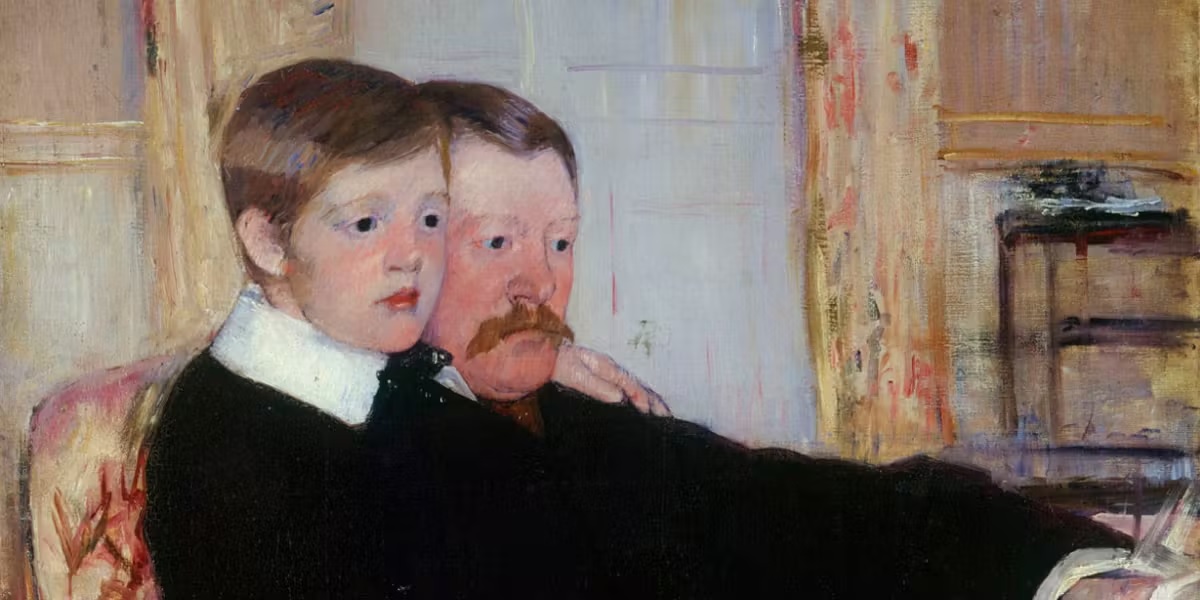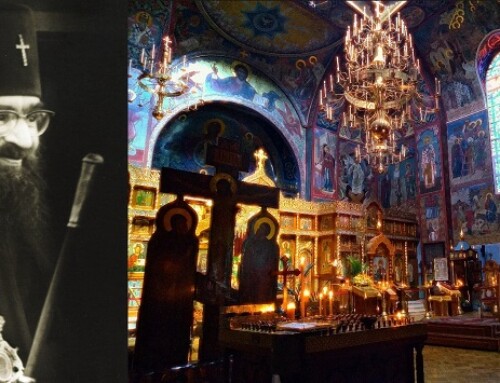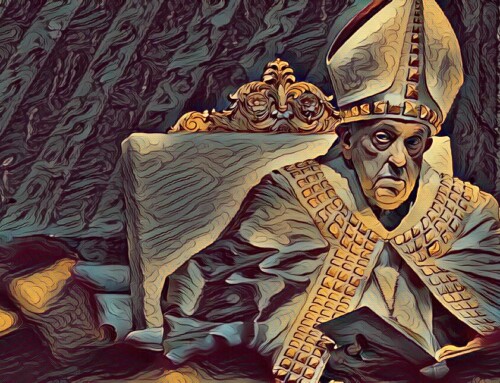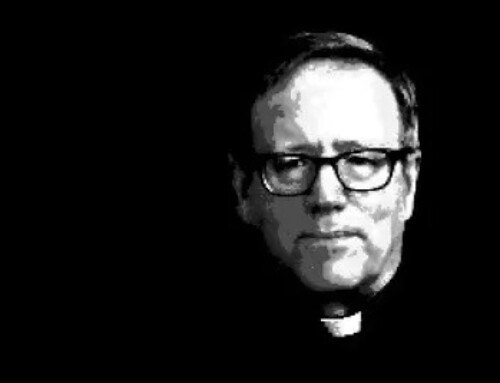Although gay activists continue to claim that homosexuality is an indelible trait, no definitive scientific evidence has ever emerged which proves that someone is “born gay.” In their authoritative 2016 study “Sexuality and Gender: Findings from the Biological, Psychological, and Social Sciences,” authors Lawrence S. Mayer and Paul R. McHugh found that:
Some of the most widely held views about sexual orientation, such as the “born that way” hypothesis, simply are not supported by science.
What has emerged, from primarily the cases studies collected by licensed practitioners in the psychiatric and psychological fields, that specifically homosexual men were more likely to report fathers who were either absent, neglectful, or abusive and mothers that were obsessive or over-compensating; this situation is sometimes referred to as “the father wound.”
American academic Camille Paglia, who spent a lifetime observing her gay male friends and associates, offered this interesting opinion:
“Here is my speculative scenario…A sensitive boy is born into a family of jocks. He is shy and dreamy from the start. His father is uncomfortable with him, and his brothers are harsh and impatient. But he is his mother’s special favorite, almost from the moment he is born. He and she are more alike. Repelled by male roughhousing, he is drawn into his mother’s and sister’s quietness and delicacy…Later, he feels like an outsider in the schoolyard. There is no male bonding; he tried to join but never fully merges with the group. Masculinity is something beautiful but ‘out there;’ it is not in him, and he knows he is feigning it. He longs for approval from other boys, and his nascent sexual energies begin to flow in that direction, pursuing what he cannot have. He will always be hungry for and awed by the masculine…”
However, one of the more compelling arguments in favor of the faulty father-son relationship as a cause for homosexuality was made by famed gay novelist Andrew Holleran in his forward to the book “The Man I Might Become: Gay Men Write About Their Fathers.” One day at a diner, according to Holleran, he observed a father and son in a neighboring booth. After a long fishing trip, the pair casually leaned up against each other: “The image of this father and son expressing their affection, their trust, their intimacy, in so unself-conscious a way, it was astounding to me – it seemed so what I was never able to do with my own.”
The truth: the majority (or at least a near majority) of homosexual men experienced same-sex molestation as children; and another majority had dysfunctional relationships with their fathers; this seems to make it evident that homosexuality is not genetically determined, but remains a matter of nurture over nature.
The Evidence:
“Homosexual males were not more mother identified than their controls, but like the female group, they were more distant from parents and other people than the matched controls.”
“Parent-child relationships and sexual identity in male and female homosexuals and heterosexuals.” Journal of Consulting and Clinical Psychology, Thompson, Norman L.. et al., (1973)
https://psycnet.apa.org/record/1974-11393-001
“Results indicate that the homosexuals came from families in which the mothers were more dominant and affectionate than the fathers. Masculine role behavior was not encouraged by either parent and positively evaluated masculine models were generally less available for homosexuals than for heterosexuals.”
“Parental relationships and early social experiences of activist male homosexuals and male heterosexuals.” Journal of Abnormal Psychology, Stephan, Walter, (1973)
https://psycnet.apa.org/record/1974-09420-001
“The data for the total samples indicated that homosexuals described their fathers and mothers as more rejecting and less loving and that they were less close to their fathers than heterosexuals.”
“Parental background of male homosexuals and heterosexuals.” Archives of Sexual Behavior, Marvin Siegelman, (1974)
https://link.springer.com/article/10.1007/BF01541038
“…there is a positive relationship between the incidence of homosexuality and the unhappy childhood of the homosexual at home.”
“The home situation and the homosexual.” The Journal of Sex Research, Azmy Ibrahim, (1976)
https://www.tandfonline.com/doi/abs/10.1080/00224497609550946
“…fathers were perceived as more nurturant in the heterosexual group than among the remaining three groups [homosexual cross-dressers, homosexual non-cross-dressers, and applicants for sex change surgery.] These findings suggest that…a nurturant father is important in the development of a heterosexual life-style.”
“Differences in psychological sex, adjustment, and familial influences among homosexual and nonhomosexual populations.” Journal of Homosexuality, B. D. Townes, et al., (1976)
https://pubmed.ncbi.nlm.nih.gov/1018096/
“During childhood there was a trend for homosexual, transvestite and transsexual subjects to report that their fathers lacked interest in them or were absent from home.”
“Parental relationships during childhood in homosexuality, transvestism and transsexualism.” The Australian and New Zealand Journal of Psychiatry, N. Buhrich and N. McConaghy, (1978)
https://pubmed.ncbi.nlm.nih.gov/278599/
“A convenience sample of 23 male homosexuals and 23 male heterosexuals were asked to draw a picture of a family. Because socialization that is predominantly maternal may contribute to cross‐sex identification and male homosexuals, compared to heterosexuals, would draw the mother figure larger than the father. The hypothesis was supported. This result suggests that family structure and socialization may be important in some types of homosexuality.”
“Dominant parent as projected by homosexual and heterosexual males.” The Journal of Sex Research, Fredrick Koenig, (1979)
https://www.tandfonline.com/doi/abs/10.1080/00224497909551055
“An undifferentiated sex-role orientation was associated with low emotional and cognitive involvement with father in males…”
“Parental antecedents of sex-role orientation in college men and women.” Sex Roles, Jacob L. Orlofsky, (1979)
https://link.springer.com/article/10.1007/bf00287324
“Patients’ reports of their father are almost always negative. He is virtually non-existent, rejecting, hostile, harsh or brutal. The fathers show neither love nor respect for this son.”
“Male Homosexuality.” The Canadian Journal of Psychiatry, Irving Bieber, et al., (1979)
https://journals.sagepub.com/doi/abs/10.1177/070674377902400507
“No homosexual subject reported the presence of a reasonably intact, positive relationship with his father or father surrogate during preadolescent years, whereas 12 of the 17 heterosexual men did.”
“Fathers, sons, and sexual orientation: replication of a Bieber hypothesis.” The Psychiatric Quarterly, R. C. Friedman and L. O, Stern, (1980)
https://pubmed.ncbi.nlm.nih.gov/7422738/
“The consistent pattern of results obtained from these three studies suggests that the emotionally distant relationships of fathers and androphilic sons [men who prefer physically mature males] relate to the sons’ atypical childhood gender identity…”
“Is the distant relationship of fathers and homosexual sons related to the sons’ erotic preference for male partners, or to the sons’ atypical gender identity, or to both?” Journal of Homosexuality, K. Freund and R. Blanchard, (1983)
https://pubmed.ncbi.nlm.nih.gov/6644002/
“Homosexual men perceived themselves as psychologically more distant from their fathers than did their heterosexual counterparts…”
“Sex role stereotypes, gender identity and parental relationships in male homosexuals and heterosexuals.” Journal of Homosexuality, C. A. Mallen, (1983)
https://pubmed.ncbi.nlm.nih.gov/6644001/
“It was found that the fathers of homosexuals and transsexuals were more hostile and less dominant than the fathers of the control group and hence less desirable identification models.”
“Parental and interpersonal relationships of transsexual and masculine and feminine homosexual men.” Journal of Homosexuality, I. Sípová and A. Brzek, (1983)
https://pubmed.ncbi.nlm.nih.gov/6644003/
“Compared to a control group of heterosexuals, the homosexual group rated their mothers significantly more rejecting and their fathers less loving and more rejecting.”
“Recalled parent-child relations and need for approval of homosexual and heterosexual men.” Archives of Sexual Behavior, J. H. Milic and D. P. Crowne, (1986)
“Gay males were found to have been more abused during adolescence. Abuse was related to a history of childhood femininity, to having poor relationships with fathers…”
“Parental physical abuse and sexual orientation in males.” Archives of Sexual Behavior, J. Harry, (1989)
https://pubmed.ncbi.nlm.nih.gov/2751419/
“In men, opposite-sex-linked behaviors and identity correlated most strongly with current negative parental and particularly paternal relationships. They also correlated strongly with negative paternal relationships in childhood. Some sex-linked behaviors and sex identity items in men correlated positively with maternal overprotection in childhood and adolescence.”
“Do sex-linked behaviors in children influence relationships with their parents.” Archives of Sexual Behavior, N. McConaghy and D. Silove, (1992)
https://pubmed.ncbi.nlm.nih.gov/1417476/
“While usually the mother has been overinvolved, the father is more often underinvolved and emotionally withholding. Typically, he has failed to recognize the both recognize as an autonomous individual and a masculine child. Emotionally unable to reach out to the son to get the relationship on its proper course, the father was either unaware of what was happening in the relationship or incapable of doing anything to rectify it. He was most likely what I call the acquiescent father.”
“Healing Homosexuality: Case Stories of Reparative Therapy.” Jason Aronson, Joseph Nicolosi, (1993)
“…homosexual men recalled their fathers as more rejecting and less loving than the heterosexual men.”
“Recollections of their fathers by homosexual and heterosexual men.” Psychological Reports, J. E, Phelan, (1996)
https://pubmed.ncbi.nlm.nih.gov/8969111/
“There is not a single even moderately well controlled study that we have been able to locate in which male homosexuals refer to father positively or affectionately. On the contrary, the consistently regard him as an antagonist.”
“Freud Scientifically Reappraised Testing the Theories and Therapy.” University of Michigan, Seymour Fisher and Roger P. Greenberg, (1996)
“…analysis indicates that for a boy/man, even a mother who has the qualities of a good enough parent, is not good enough to enable him to reach a nonconflicted manhood. A mother cannot provide for the boy the male model he needs and is searching for, the male who would affirm him in his maleness.”
“Some roots of persistent homosexual fantasy and the quest for father’s love: conflicted parental identifications in a male patient: fragment of an analysis.” Psychoanalytic Review, Ruth F. Lax, (1997)
https://pubmed.ncbi.nlm.nih.gov/9522407/#full-view-affiliation-1
“A pathologic family environment is often present in the family of homosexuals.”
“Is Homosexuality Normal?” The Journal of Psychiatry & Law, Norman Q. Brill, et al., (1998)
https://journals.sagepub.com/doi/10.1177/009318539802600204?icid=int.sj-abstract.similar-articles.8
“Homosexual/bisexual men reported higher rates than heterosexual men of childhood emotional and any physical maltreatment (including major physical maltreatment) by their mother/maternal guardian and major physical maltreatment by their father/paternal guardian.”
“Reports of parental maltreatment during childhood in a United States population-based survey of homosexual, bisexual, and heterosexual adults.” Child Abuse & Neglect, Heather L Corliss, et al., (2002)
https://pmc.ncbi.nlm.nih.gov/articles/PMC4194076/
“Results indicated that those seminarians who identified their sexual orientation as homosexual scored significantly lower on their level of intimacy with their fathers than did heterosexual seminarians.”
“Emotionally Absent Fathers: Furthering the Understanding of Homosexuality.” Journal of Psychology and Theology, Ray A. Seutter, et al., (2004)
https://journals.sagepub.com/doi/abs/10.1177/009164710403200105
“…heterosexual men receive more affection from their own fathers than do homosexual or bisexual men.”
“Human affection exchange: VI. Further tests of reproductive probability as a predictor of men’s affection with their adult sons.” The Journal of Social Psychology, Kory Floyd, et al., (2004)
https://pubmed.ncbi.nlm.nih.gov/15074506/
“Gender nonconformity was significantly associated with paternal, maternal, and peer rejection in childhood.”
“Gender Nonconformity, Childhood Rejection, and Adult Attachment: A Study of Gay Men.” Archives of Sexual Behavior, Monica A. Landolt, et al., (2004)
https://link.springer.com/article/10.1023/B:ASEB.0000014326.64934.50
“Self-reported childhood sexual abuse was associated with same-sex sexual behavior. Participants who engaged in same-sex sexual behavior and those who identified themselves as homosexual or bisexual perceived more distance between themselves and their fathers than those who did not. Being sexually abused by someone of one’s own sex was related to same-sex sexual orientation in male participants…”
“Same-sex sexual orientation, childhood sexual abuse, and suicidal behavior in university students in Turkey.” Archives of Sexual Behavior, Mehmet Eskin, et al., (2005)
https://pubmed.ncbi.nlm.nih.gov/15803252/
“For men, homosexual marriage was associated with having older mothers, divorced parents, absent fathers…”
“Childhood family correlates of heterosexual and homosexual marriages: a national cohort study of two million Danes.” Archives of Sexual Behavior, Morten Frisch and Anders Hviid, (2006)
https://pubmed.ncbi.nlm.nih.gov/17039403/
“Ratings of maternal and paternal over-control and coldness differed as a function of same-sex sexual attraction or behavior. Childhood GAB [childhood gender atypical behavior] was correlated with negative ratings of parental relationships. Both same-sex sexual attraction or behavior and a history of childhood GAB affected the reported levels of current depression and anxiety.”
“Psychiatric symptoms and same-sex sexual attraction and behavior in light of childhood gender atypical behavior and parental relationships.” Journal of Sex Research, Katarina Alanko, et al., (2009)
https://pubmed.ncbi.nlm.nih.gov/19343579/
“The majority of gay men, unlike heterosexual men who come for treatment, report that their fathers were distant during their childhood and that they lacked any attachment to them. Reports vary from ‘my father was never around, he was too busy with his job,’ to ‘he was victimized by my mother, who was always the boss in the family,’ to that of the abusive, unapproachable father.”
“Being Homosexual: Gay Men and Their Development.” Knopf Doubleday, Richard Isay, (2009)
“…gay men do indeed describe their relationships with their mothers as closer, and their relationships with their fathers as more distant or hostile, as compared with how straight men describe their relationships.”
“Gay, Straight, and the Reason Why: The Science of Sexual Orientation.” Oxford University Press, Simon Le Vay, (2011)
“…childhood sexual abuse and risky family environment were significant predictors of both sexual orientation and depression, further contributing to their correlation.”
“Do shared etiological factors contribute to the relationship between sexual orientation and depression?” Cambridge University Press, B. P. Zietsch, et al., (2011)
https://www.cambridge.org/core/journals/psychological-medicine/article/abs/do-shared-etiological-factors-contribute-to-the-relationship-between-sexual-orientation-and-depression/8E34DC46B002901006F7A44FC4B201DC
“Sexual minority individuals were on average…more likely to experience sexual abuse, parental physical abuse…”
“A Meta-Analysis of Disparities in Childhood Sexual Abuse, Parental Physical Abuse, and Peer Victimization Among Sexual Minority and Sexual Nonminority Individuals.” American Journal of Public Health, Mark S. Friedman, et al., (2011)
https://ajph.aphapublications.org/doi/full/10.2105/AJPH.2009.190009
“All of the family characteristics used as instruments strongly predicted experience of sexual abuse and maltreatment. The strongest association was between parental alcohol abuse and non-sexual maltreatment.”
“Does Maltreatment in Childhood Affect Sexual Orientation in Adulthood?” Archives of Sexual Behavior, Andrea L. Roberts, et al., (2012)
https://pmc.ncbi.nlm.nih.gov/articles/PMC3535560/
“Compared with heterosexual respondents, gay/lesbian and bisexual individuals experienced increased odds of six of eight and seven of eight adverse childhood experiences, respectively. Sexual minority persons had higher rates of adverse childhood experiences compared to their heterosexual peers.”
“Disparities in Adverse Childhood Experiences among Sexual Minority and Heterosexual Adults: Results from a Multi-State Probability-Based Sample.” PLOS One, Judith P Andersen and John Blosnich, (2013)
https://journals.plos.org/plosone/article?id=10.1371/journal.pone.0054691
“Among 287 participants, 211 (73.5%) reported experiencing CPA (childhood physical abuse) before the age of 17…Perpetrators most commonly reported included fathers (60.5%), mothers (36.8%) and male relatives (15.8%).”
“Association between Childhood Physical Abuse, Unprotected Receptive Anal Intercourse and HIV Infection among Young Men Who Have Sex with Men in Vancouver, Canada.” PLOS One, Arn J. Schilder, et al., (2014)
https://journals.plos.org/plosone/article?id=10.1371/journal.pone.0100501
“The prevalence rates of child physical abuse significantly differed across sexual orientations for men. Specifically, heterosexual men reported fewer cases of physical abuse than gay men. The prevalence rates of child sexual abuse also significantly differed across sexual orientations…Rates of neglect also differed across sexual orientation among men. Heterosexual men reported fewer instances of neglect than gay men and bisexual men. Rates of household dysfunction also differed across sexual orientation among men. Specifically, heterosexual men reported fewer household dysfunction events than bisexual men and gay men.”
“Comparing the Rates of Early Childhood Victimization across Sexual Orientations: Heterosexual, Lesbian, Gay, Bisexual, and Mostly Heterosexual.” PLOS One, Christopher Zou and Judith P. Andersen, (2015)
https://pubmed.ncbi.nlm.nih.gov/26444428/
“Informants being homosexual (MSM) as a result of coercive (harsh) parenting, in which the father is temperamental, and the mother’s parenting is dominant (loss of a father figure), and permissive parenting.”
“The Effects of Parenting Role in Forming Homosexual Behaviour and Its Risk Towards HIV and AIDS in Young MSM.” Journal of Applied Environmental and Biological Sciences, Dewi Rokhmah, et al., (2016)
https://www.researchgate.net/profile/Dewi-Rokhmah/publication/306108469_The_Effects_of_Parenting_Role_in_Forming_Homosexual_Behaviour_and_Its_Risk_Towards_HIV_and_AIDS_in_Young_MSM/links/57b2440508ae0101f17a5c85/The-Effects-of-Parenting-Role-in-Forming-Homosexual-Behaviour-and-Its-Risk-Towards-HIV-and-AIDS-in-Young-MSM.pdf
“Paternal rejection was positively correlated with PTSD.”
“Association between childhood parental rearing, sexual partnerships, social support and posttraumatic stress disorders (PTSD) among young HIV-positive MSM.” Psychological and Socio-medical Aspects of AIDS/HIV, Li Luo, et al., (2019)
https://www.tandfonline.com/doi/abs/10.1080/09540121.2020.1842848
“A significantly higher proportion of non‐heterosexual than heterosexual individuals, especially those with a bisexual identity, had experienced a childhood burdened by physical, psychological or sexual abuse…Several challenges within the household were reported significantly more often by non‐heterosexual than heterosexual individuals. In particular, more bisexual women, homosexual men and bisexual men than heterosexual peers were raised in households where someone was mentally ill or had tried to commit suicide; more bisexual women, homosexual men and bisexual men than heterosexual peers had parents who got divorced or split up…”
“Adverse childhood experiences and mental health problems in a nationally representative study of heterosexual, homosexual and bisexual Danes.” World Psychiatry, Josefine Bernhard Andresen, et al., (2022)
https://pmc.ncbi.nlm.nih.gov/articles/PMC9453895/
“…LGBQ students experienced substantially more abuse and had significantly poorer mental health and greater suicidality than heterosexual students.”
“Associations Between Verbal and Physical Abuse in the Home and Mental Health Indicators Among Heterosexual and Lesbian, Gay, Bisexual, and Questioning High School Students in the US-Adolescent Behaviors and Experiences Survey, 2021.” The Journal of Adolescent Health, Kathleen A. Ethier, et al., (2024)
https://pubmed.ncbi.nlm.nih.gov/37791925/





